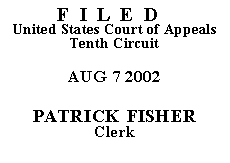

| UNITED STATES OF AMERICA,
v.
RICARDO CHAVEZ-JACOBO, also
known as Manuel Lopez-Gomez, also
known as Enrique P. Dominguez, also
known as Carlos Luis Hernandez |
|
Mr. Chavez-Jacobo pled guilty on the day his trial was scheduled (May 21, 2002) to one count of unlawful reentry by a previously deported alien, after having sustained two convictions for aggravated felonies, in violation of 8 U.S.C. §§ 1326(a) and (b)(2). Prior to trial (May 10), he informed the government that he would testify at trial and admit to illegal reentry, but dispute his prior convictions and their application to his sentencing. Three days before trial (May 18), once he understood that his sentence would not be determined at trial, he informed the government that he would plead guilty. He pled guilty and was later sentenced to 84 months imprisonment and three years supervised release.
Mr. Chavez-Jacobo's counsel has filed a brief pursuant to Anders v. California, 386 U.S. 738 (1967) and has moved to withdraw. Anders holds that if counsel finds an appeal "to be wholly frivolous, after a conscientious examination of it, he should so advise the court and request permission to withdraw." Id. at 744. Counsel must also submit to the court a brief addressing anything in the record that arguably supports the appeal. Id. In the Anders brief, Mr. Chavez-Jacobo's counsel points to the district court's denial of a further one point reduction under United States Sentencing Guidelines ("U.S.S.G.") § 3E1.1(b)(2) and the denial of a motion for a downward departure for over-representation of criminal history. Mr. Chavez-Jacobo has not filed a brief in response. We have conducted an independent review. Because we agree that there are no non-frivolous issues on appeal, we grant counsel's motion to withdraw, affirm Mr. Chavez-Jacobo's sentence, and dismiss that part of the appeal that challenges the denial of downward departure.
The district court granted Mr. Chavez-Jacobo a two-point reduction for acceptance of responsibility, but denied an additional one point reduction under U.S.S.G. § 3E1.1(b)(2). Although the presentence report recommended an additional point for his guilty plea, the government objected and the district court denied the additional point because of the plea's untimeliness. To qualify for a reduction under § 3E1.1(b), the defendant must prove by a preponderance of the evidence that he is entitled to the additional reduction. See United States v. Patron-Montano, 223 F.3d 1184, 1189 (10th Cir. 2000); United States v. Kirk, 894 F.2d 1162, 1164 (10th Cir. 1990). We review a district court's factual findings regarding acceptance of responsibility under § 3E1.1 for clear error. United States v. McLeod, 127 F.3d 1284, 1290 (10th Cir. 1997) (internal quotation omitted).
"Timely" for the purposes of the further one point reduction is "particularly early in the case." U.S.S.G. § 3E1.1, cmt. 6. Section (b)(2) is focused on conserving government and court resources. Even if we were to construe Mr. Chavez-Jacobo's planned admissions as a notice of an intention to plead guilty, numerous cases support the denial of a one point reduction where the defendant gives only an intention of pleading guilty less than ten days before trial and does not actually plead guilty until the day of trial. See, e.g., United States v. Nielsen, 232 F.3d 581, 58384 (7th Cir. 2000) (intent to plead guilty ten days before trial not sufficient to earn reduction); United States v. Hernandez, 218 F.3d 272, 280 (3d Cir. 2000) (intent to plead guilty two weeks before trial not sufficient where plea was entered one day before trial); United States v. Kubick, 205 F.3d 1117, 1125-1127 (9th Cir. 1999) (reduction denied where plea agreement was not completed until thirteen days before trial). Further, as the trial court pointed out, an "intention" to plead guilty is of little benefit in preserving government and court resources. Until there is a completed plea agreement, the defendant may change his mind. See United States v. Francis, 39 F.3d 803, 80708 (7th Cir. 1994).
Here, Mr. Chavez-Jacobo did not actually plead guilty until the day of trial. As found by the district court, virtually no government or court resources were conserved. The district court did not err by denying the additional one point reduction under such circumstances.
With respect to the denial of Mr. Chavez-Jacobo's motion for a downward departure, unless the district judge's language unambiguously states that the judge does not believe he has the authority to make a downward departure, we do not have jurisdiction to review the denial of the motion. United States v. Rodriguez, 30 F.3d 1318, 1319 (10th Cir. 1994). The transcript of Mr. Chavez-Jacobo's sentencing hearing contains no such statement. The judge evaluated the possibility of a downward departure and found that it was not warranted by the facts of the case. The district court apparently understood that it had the authority to grant a downward departure, but denied it. As such, we do not have appellate jurisdiction to review the denial of the downward departure and must dismiss this part of the appeal.
As required by Anders, we have examined the entire record and find no meritorious issues for appeal. Accordingly, Mr. Chavez-Jacobo's sentence is AFFIRMED, counsel's motion to withdraw is GRANTED, and that part of the appeal over which we lack jurisdiction is DISMISSED.
Entered for the Court
Paul J. Kelly, Jr.
Circuit Judge
*. This order and judgment is not binding precedent, except under the doctrines of law of the case, res judicata, and collateral estoppel. This court generally disfavors the citation of orders and judgments; nevertheless, an order and judgment may be cited under the terms and conditions of 10th Cir. R. 36.3.
2. After examining the briefs and the appellate record, this three-judge panel has determined unanimously that oral argument would not be of material assistance in the determination of this appeal. See Fed. R. App. P. 34(a); 10th Cir. R. 34.1(G). The cause is therefore ordered submitted without oral argument.